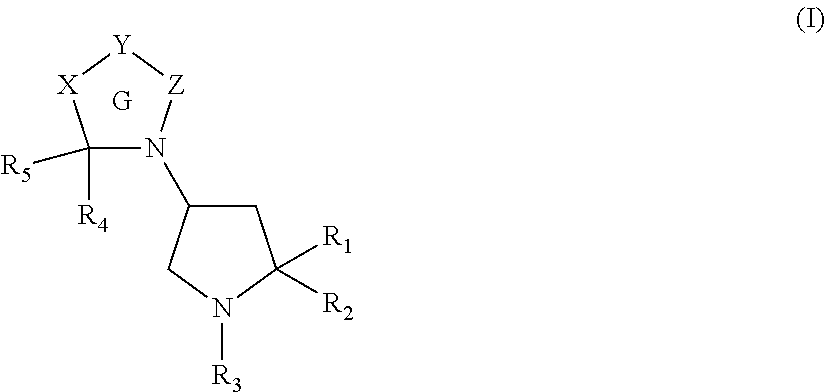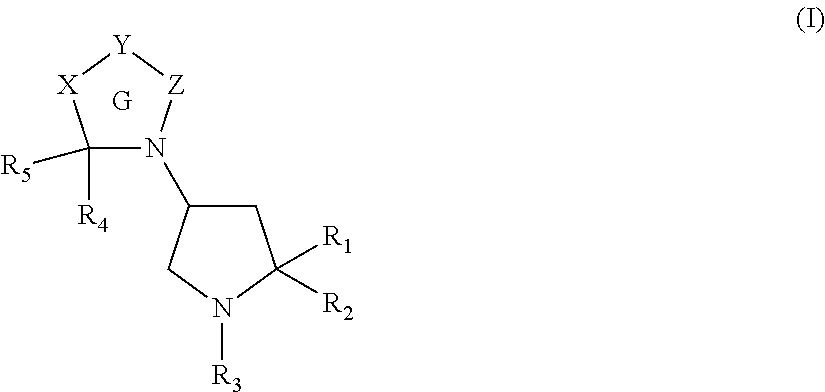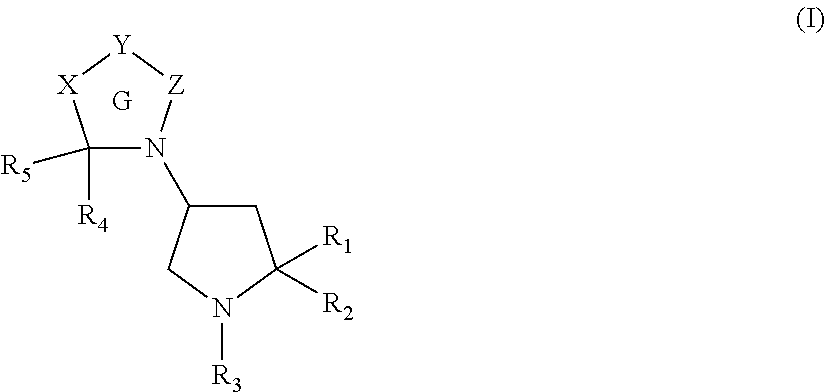Pyrrolidine derivatives as angiotensin ii type 2 antagonists
- Summary
- Abstract
- Description
- Claims
- Application Information
AI Technical Summary
Benefits of technology
Problems solved by technology
Method used
Image
Examples
example 1
Compound 1 (2S,4S)-1-(2,2-Diphenylacetyl)-4-(2,3,4,5-tetrahydro-1H-benzo[b]azepin-1-yl)pyrrolidine-2-carboxylic acid
[0261]
[0262]Procedure for the Preparation of 1b
[0263]A solution of 2,3,4,5-tetrahydro-1H-benzo[b]azepine (300 mg, 2.05 mmol) in 1,2-dichloroethane (5 mL) was added to a solution of (S)-1-tent-butyl 2-methyl 4-oxopyrrolidine-1,2-dicarboxylate 1a (500mg, 2.05 mmol) in 1,2-dichloroethane (5 mL) whilst stirring at RT under an atmosphere of nitrogen. After 5 min AcOH (0.23 mL, 4.1 mmol) was added. After 45 min tetramethylammonium triacetoxyhydroborate (650 mg, 2.5 mmol) was added in one portion and the mixture was stirred at RT for 18 h. The mixture was diluted with DCM (40 mL) then washed with saturated aqueous NaHCO3 (40 mL). The aqueous solution was extracted with DCM (20 mL) then the combined organic solutions were washed with saturated brine (20 mL), dried over Na2SO4 and filtered. The solvent was removed in vacuo and the residue was purified by silica gel chromatograp...
example 2
Compound 2 (2S,4S)-1-(2,2-Diphenylacetyl)-4-(8-fluoro-2,3,4,5-tetrahydro-1H-benzo[b]azepin-1-yl)pyrrolidine-2-carboxylic acid
[0268]
[0269]Procedure for the Preparation of 2b
[0270]2,2-Diphenylacetyl chloride (12 g, 46 mmol) was added to a stirred mixture of (2S,4R)-methyl 4-hydroxypyrrolidine-2-carboxylate.HCl 2a (10 g, 55 mmol) and NaHCO3 (9.6 g, 115 mmol) in water (200 mL) and DCM (200 mL) under an atmosphere of nitrogen whilst chilling with iced water. The biphasic mixture was allowed to warm to RT and stirred for 1.5 h. The layers were separated and the organic phase was washed with water (150 mL) and saturated brine (150 mL). The organic solution was dried over MgSO4, filtered then concentrated in vacuo to afford a pale yellow gum. The product was purified by silica gel chromatography (220 g, 0-70% EtOAc / isohexane) to afford (2S,4R)-methyl 1-(2,2-diphenylacetyl)-4-hydroxypyrrolidine-2-carboxylate 2b (12 g, 76%) as a white solid: m / z 340 [M+H]+ (ES+) at Rt 1.79 min (Method 1).
[027...
example 3
Compound 8 (2S,4S)-1-(2,2-Diphenylacetyl)-4-(7-fluoro-3,4-dihydrobenzo[b][1,4]oxazepin-5(2H)-yl)pyrrolidine-2-carboxylic acid
[0280]
[0281](2S,4S)-1-(2,2-Diphenylacetyl)-4-(7-fluoro-3,4-dihydrobenzo[b][1,4]oxazepin-5(2H)-yl)pyrrolidine-2-carboxylic acid 8 (19 mg, 49% for final step) was prepared in essentially the same manner as for Compound 2 (Example 2) except that 7-fluoro-2,3,4,5-tetrahydrobenzo[b][1,4]oxazepine (prepared in the same manner as 2e) was used instead of 8-fluoro-2,3,4,5-tetrahydro-1H-benzo[b]azepine 2e in step 3: m / z 475 [M+H]+ (ES+), 473 (M−H)− (ES−) at Rt 6.93 min (Method 1).
PUM
 Login to View More
Login to View More Abstract
Description
Claims
Application Information
 Login to View More
Login to View More - R&D
- Intellectual Property
- Life Sciences
- Materials
- Tech Scout
- Unparalleled Data Quality
- Higher Quality Content
- 60% Fewer Hallucinations
Browse by: Latest US Patents, China's latest patents, Technical Efficacy Thesaurus, Application Domain, Technology Topic, Popular Technical Reports.
© 2025 PatSnap. All rights reserved.Legal|Privacy policy|Modern Slavery Act Transparency Statement|Sitemap|About US| Contact US: help@patsnap.com



